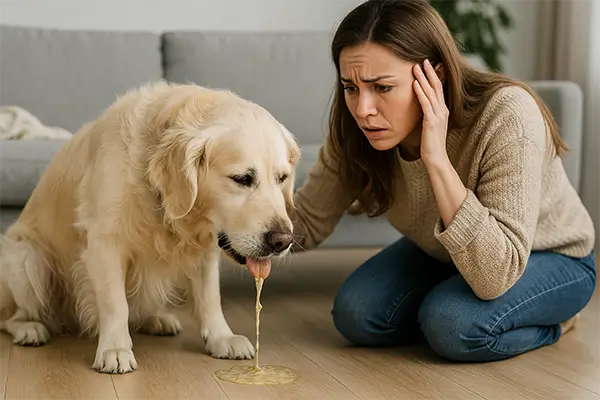
Have you seen your dog throw up yellow fluid or white foam early in the morning or late at night before eating anything?
This is commonly known as empty stomach vomiting or fasting vomit. Many dog owners experience this situation at least once. While it might seem like a harmless symptom, it could also be a signal of underlying health issues.
In this post, we’ll explore the causes, home remedies, and warning signs that indicate a visit to the vet may be necessary.
What Is Empty Stomach Vomiting?
It refers to a dog vomiting bile (yellow liquid), stomach acid, or foam when the stomach is empty. It usually occurs in the early morning or late at night after a long period without food.
Common Causes of Fasting Vomit
- Long gaps between meals
- Bile can build up and irritate the stomach lining.
- Sensitive digestion or weak gastrointestinal function
- Stress or environmental changes
- Moving, being left alone longer than usual, or travel can increase vomiting.
- Past history of gastritis, bile reflux, or digestive illness
Home Remedies You Can Try
- Feed a small snack before bedtime
- A light, digestible snack can help buffer the stomach overnight.
- Stick to a regular feeding schedule
- Consistent meals help prevent bile buildup and irritation.
- Switch to easily digestible food
- Consider sensitive stomach or allergy-friendly formulas.
- Reduce stress
- Increase playtime, reduce alone time, maintain a calm environment.
When to See a Vet
- Vomiting more than twice a day
- Vomiting after eating or loss of appetite
- Vomit includes blood, green bile, or appears black
- Additional symptoms like lethargy, diarrhea, or weight loss
These may indicate serious issues such as pancreatitis, gastritis, or liver problems, and require immediate veterinary attention.
Summary
- Fasting vomit may seem minor but could be a signal of stomach trouble.
- Feeding routines and small snacks can prevent symptoms in many cases.
- If the condition is persistent or worsening, visit your vet promptly.